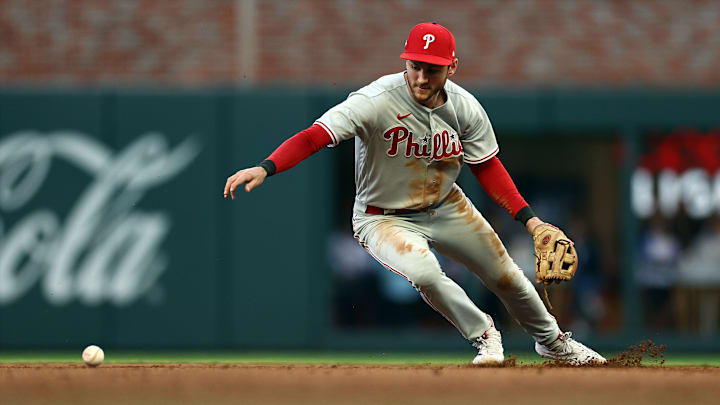Bryce Harper
Finally, the culprit that probably hurt the most was none other than Phillies superstar Bryce Harper.
As one of the Phillies’ top offensive weapons on the team, Harper was somewhat of a disappointment during the NL Wild Card series despite the Phillies easily handling the Marlins. Harper only mustered one hit in eight plate appearances, but he did manage to score two runs to at least help the team in that department.
Harper certainly made up for it a bit in Game 1 of the NLDS, as he added a solo home run to help the Phillies in their 3-0 shutout win over the Braves. However, he probably wishes that Game 2 never happened.
First, he failed to come through in the clutch twice, in moments that could have put the game away for the Phillies — once in the fourth inning when he grounded out with two runners aboard and again in the sixth when he popped out with two runners on base.
Those pale in comparison with the play that will probably be replayed in highlights for years to come. Harper committed a huge baserunning blunder on the final play of the game, costing the Phillies any chance of a comeback.
In the ninth inning, with Harper on first after a leadoff walk, Nick Castellanos hit the ball hard to deep center field. Harper believed it would definitely fall for extra bases; he failed to stop at second and busted his way to third. Braves’ outfielder Michael Harris II made a superb leaping catch and quickly threw the ball back into the infield to double off Harper and end the game.
In the playoffs, when the difference in a game could be just a game of inches, Harper should have made sure the ball was down first before heading aggressively toward third base. There was only one out at the time, so even if he didn’t score on the play, the Phillies would have had runners at second and third and be in a good position to tie or take the lead.
However, Harper's baserunning miscue ended up costing them the game, along with giving the Braves life and momentum heading into Game 3.
